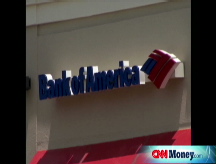BofA, Countrywide forge ahead
Chances are the merger will still happen despite some opposition. But that $4 billion price tag may not hold.
 |
| The $4 billion price tag for the Bank of America-Countrywide deal has already fostered some opposition from investors on both sides of the aisle. |

NEW YORK (CNNMoney.com) -- Could Bank of America Corp.'s proposed buyout of Countrywide Financial Corp. fall apart?
Experts believe the high-profile tie-up will still happen - but it could look a lot different than it did when it was first announced in January.
So far, resistance to the deal has come from two groups: investors and consumers. Large institutional shareholders, for example, have blasted Countrywide (CFC, Fortune 500) management in recent months, claiming that the buyout price of $4 billion was not high enough.
At the same time, some consumer groups wonder whether the all-stock deal dismisses the concerns of thousands of Americans who are suffering as a result of the housing crisis.
In fact, dozens of groups questioned the deal in Chicago on Tuesday, the first of two scheduled public hearings sponsored by the Federal Reserve. The second hearing is slated in Los Angeles later this month.
Still, most analysts who cover the banking sector seem convinced that the controversial deal will still happen - and for good reason.
First and foremost, regulators such as the Federal Reserve want to see the deal happen. The central bank has already had to step in to orchestrate a rescue of one troubled financial services firm when it helped forge the deal between Bear Stearns and JPMorgan Chase (JPM, Fortune 500) last month - a move that drew plenty of criticism from both Congress and Main Street.
"Regulators would rather that self-regulation take place within the market, rather than having to step in if a deal were not completed," said Walter O'Haire, senior analyst with Celent, a Boston-based financial research and consulting firm.
Were Bank of America (BAC, Fortune 500) to abandon Countrywide, it would most likely not only get messy, but expensive. For example, the Federal Deposit Insurance Corp., which backs the many banking products that Countrywide still offers - such as certificates of deposit and money market accounts - would find itself on the hook.
Luckily for regulators, Bank of America still appears to be quite committed to the deal, in large part to protect the $2 billion investment it made late last summer when it acquired a 16% stake in the mortgage lender. There's also the benefit that the deal would extend Bank of America's reach in the mortgage business, making it the nation's largest lender.
During the company's first-quarter earnings conference call Monday, CEO Ken Lewis said he expected the deal to close sometime this summer, during the early part of the third quarter.
Changes ahead?
But with a completion date months away, there remains the possibility that the terms of the deal could change before then, most notably the $4 billion price tag.
Last week, Lehman Brothers analyst Bruce Harting suspected that Bank of America investors will wonder whether they are paying too much for Countrywide given the latest troubles in the mortgage lender's loan portfolio, particularly among options ARMs, or option adjustable-rate mortgage loans.
"We suspect the weak credit should keep investors anxious about BAC's interest in closing the acquisition of Countrywide at the current price," Harting wrote.
Serving as a counterbalance have been the concerns of large institutional shareholders in Countrywide such as the Monaco-based hedge fund SRM Global. It has blasted company management in recent months, claiming that the buyout price of $4 billion was not high enough.
The firm has scooped up shares in recent weeks, increasing its Countrywide stake to 8.1%, setting the stage for what could be an ugly shareholder confrontation.
"You have one group of shareholders saying the deal at $4 billion is a bad deal and another group of stockholders saying it is not enough," said Celent's O'Haire. "If you look at Countrywide [stock price], the smart money is not betting that it will not get a better deal."
Under the original terms of the deal, shareholders of the Calabasas, Calif.-based Countrywide would receive 0.1822 share of Bank of America stock in exchange for each share of Countrywide. At the time of the announcement, Countrywide was valued at about $4 billion, or $7.16 a share - which is about 6% more than its current value based on Bank of America's stock price Tuesday.
But in dealing with the consumer issues, Bank of America has made some initial concessions. The Charlotte, N.C.-based bank announced Tuesday it would stop peddling risky mortgages, including subprime and other non-traditional loans, after it completes the Countrywide purchase.
Still, some consumer groups and lawmakers may push them to go further.
In February, a group of nearly 100 different California community groups petitioned Bank of America to declare a moratorium on foreclosures of all mortgage loans in the two companies' loan portfolios. It also sought to modify loans for borrowers in danger of losing their homes to a fixed conventional loan with an interest rate of no more than 6%.
But it's unlikely Bank of America - or its investors - would agree to such concessions without a fight, said Jackie Reeves, managing director at Bell Rock Capital LLC, who heads the firm's bank research and portfolio strategy group.
"From a consumer perspective, people were clearly wronged," she said. "But I can see a pretty big hornet's nest should we start to go down that path." ![]()


